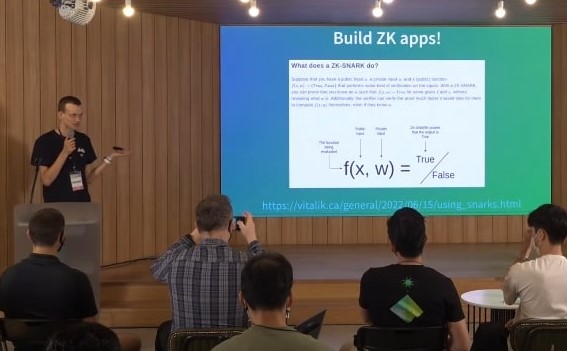09 Aug 2022 10:30 PM GMT+5:30 · 3 min read

Ethereum (ETH) co-founder Vitalik Buterin has listed several points that he argues are worth working on, during the ETH Seoul 2022, an Ethereum and blockchain-focused event held in South Korea.
In the first place, the Ethereum mastermind encouraged developers to build rollups, a type of scaling solution that involves rolling-up transactions and presenting them as a single transaction to decrease costs while increasing speed.
He specifically emphasized the growth of zero-knowledge technologies, and the need for more work on zero-knowledge rollups, aka zk-rollups. Buterin said that succinct non-interactive zero-knowledge proofs (zk-SNARKs), a proof architecture where one can demonstrate ownership of specific knowledge without disclosing that knowledge, are almost as important as the blockchain technology itself.
“I actually think zk-SNARKs might be like almost or even equally as important to the f,,,] privacy, openness, and […] freedom kind of alternative. decentralized, web tech movement as blockchains are,” Buterin said.
He said zk-SNARKs are “extremely” effective at giving users privacy and scalability while preserving security, which is comparable to what blockchains are trying to do. He added that zero-knowledge proofs can actually act as a compliment to blockchains.
Blockchains aim to provide a lot of security, but in exchange, they sacrifice privacy and scalability. On the other hand, zk-SNARKs give back privacy and scalability – “so build ZK apps,” Buterin said.
He further encouraged developers to focus on privacy, claiming that it is less explored compared to scalability.
Notably, there are already some attempts to create protocols focused on preserving privacy. For instance, there is Proof of Humanity (PoH), a social identity verification system for humans developed on the Ethereum blockchain.
“In Ethereum, we are starting to have more and more of these protocols. They are issuing some kind of attestation at specific addresses to say something about the person who controls that address,” Buterin said, adding that such protocols can make airdrops and decentralized governance fairer by removing identical users.
Proof of Attendance Protocol (POAP), a protocol that creates digital badges or collectibles through the use of blockchain technology, is another such project. This protocol can confirm that an address belongs to someone who participated in an event without revealing the identity of the person.
Buterin also encouraged developers to consider working on soulbound tokens, which are tokens that can’t be sold or separated from their owners.
He has been very vocal about these tokens recently. After initially exploring the idea in a blog post earlier this year, Buterin co-authored a research paper in mid-May explaining how non-transferable Soulbound Tokens (SBTs) can create a richer, pluralistic ecosystem within Ethereum. Buterin suggested that soulbound tokens would be able to encode social relationships of trust.
These tokens could be used for exclusive airdrops, or “souldrops,” allowing an organization to choose the right members based on their needs.
Another area that Buterin argues developers should try to improve is public goods funding. He noted that Bitcoiners already have a public goods funding called quadratic funding, which is a more optimal way to fund public goods.
However, he said that there are opportunities to improve quadratic funding by making the mechanism better, and by increasing security and privacy.
Lastly, Buterin said that developers should aim for better decentralized autonomous organization (DAO) governance. He said the current governance model in DAOs is either centralized or attackable, due to the coin-based governance that they employ.
Buterin claimed that the coin-based governance is “fundamentally broken,” encouraging developers to consider governance models that are not coin-driven. This is also where things like souldbound tokens and Proof of Humanity can prove useful as they can help make sure only real and unique humans are participating in governance.

